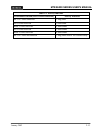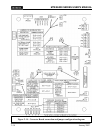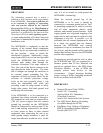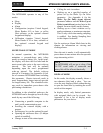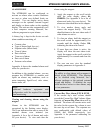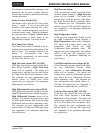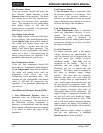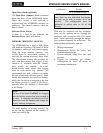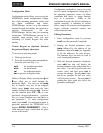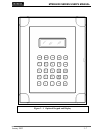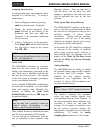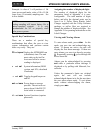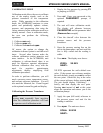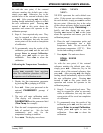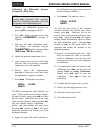
MTEK6000 SERIES USER'S MANUAL
January 2002 3 -5
Open Door Alarm (optional)
The Open Door (tamper) alarm is initiated
when the door of the MTEK6000 opens.
When this occurs, a full wake-up is
triggered and the MTEK6000 executes its
processes. The alarm is inactive when the
door is closed.
Software Error Alarm
If there is a fault in the software, the
Software Error alarm will initiate.
MEMORY (HISTORY LOGGING)
The MTEK6000 has a total of 96K (Main
64K bank and Auxiliary 32K bank) of RAM
for database, audit trail, and history logging.
With the large memory capacity, over
81,000 bytes of non-volatile memory is
reserved for storing historical meter data.
The non-editable history file provides the
user with time-related data logged in any
variation of selectable intervals: minute,
daily, weekly, and monthly. An event-
driven history mode allows data logging
when an event occurs (e.g., alarms). An
experienced user with software can define
the type of data and collection period. Since
history data elements are stored in a memory
block, the size has to be assigned at the time
the history process is created in the device,
typically when the database is downloaded
at the factory.
NOTE
The size of the block CANNOT be changed
once the history process has been created in
the unit. A complete download would be
required to reset the database and change the
device's memory assignment.
The total number of records (entries) the
device can log depends on the number of
items you wish to log:
# of Record = 81,000 .
4 x (# of items to log +1)
NOTE
Since there are two individual data banks,
you may not be able to access all of the
memory. The configuration must be
optimized to utilize most or all of the
memory.
Data may be collected over the telephone
lines via the modem, on-site through the
enclosure side connector (RS-232C serial
port), and/or optionally through the optical
port (software required for collection). The
collected data can then be used for:
1. Billing information
2. Measurement reports for utility and
customer management.
3. System analysis using flow rate and
pressure.
4. Support for estimating gas volume
consumption in cases of meter or
instrument malfunction.



